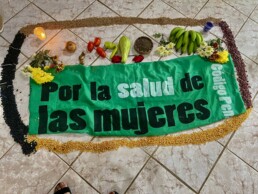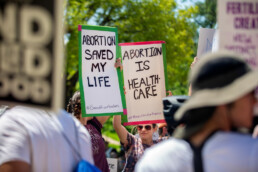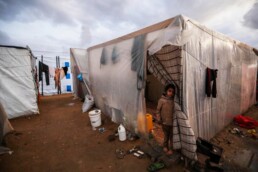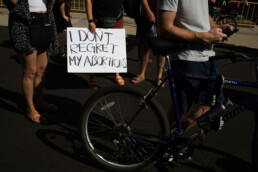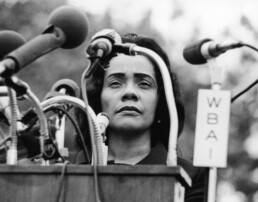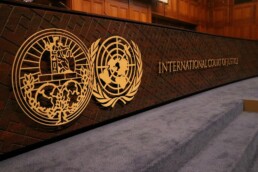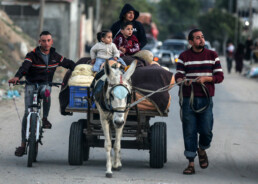A World Without Exceptions
Uncategorized
The devastating consequences of the Dominican Republic’s absolute abortion ban
Standing on the threshold of her home, Niurki, 18, holds her fussy two-year-old baby boy in her arms and surveys the only landscape she’s ever known. The rusty tin roof on her weathered, pale yellow house barely offers protection against the elements. Niurki lives in San Cristobal in the Dominican Republic, a country that attracted seven million tourists in 2022 alone. But it also boasts one of the highest rates of teen pregnancies in Latin America, a consequence of several factors, including the total abortion ban in effect there since 1884.
Niurki didn’t want a baby. Her ex-boyfriend and the baby’s father, Carlos, left her the day that she found out she was pregnant. Niurki says she didn’t consider an abortion because of her Catholic faith. But it wouldn’t have mattered; the procedure was illegal anyway. So she had the baby, and, like 44% of teen moms in the country, eventually had to drop out of school to raise her now toddler. Today, Niurki is unable to work because she does not have access to childcare. Her ex is forced to pay child support, but it’s a paltry $35 per month. “I depend entirely on him,” she laments. “Most of the time, he’s late, and we’re left with nothing.”
“The worst,” she tells me, her voice still childlike, “is when I don’t have money for food or milk. I make some fruit juices to calm the baby’s hunger, but he keeps crying. It’s despairing.”
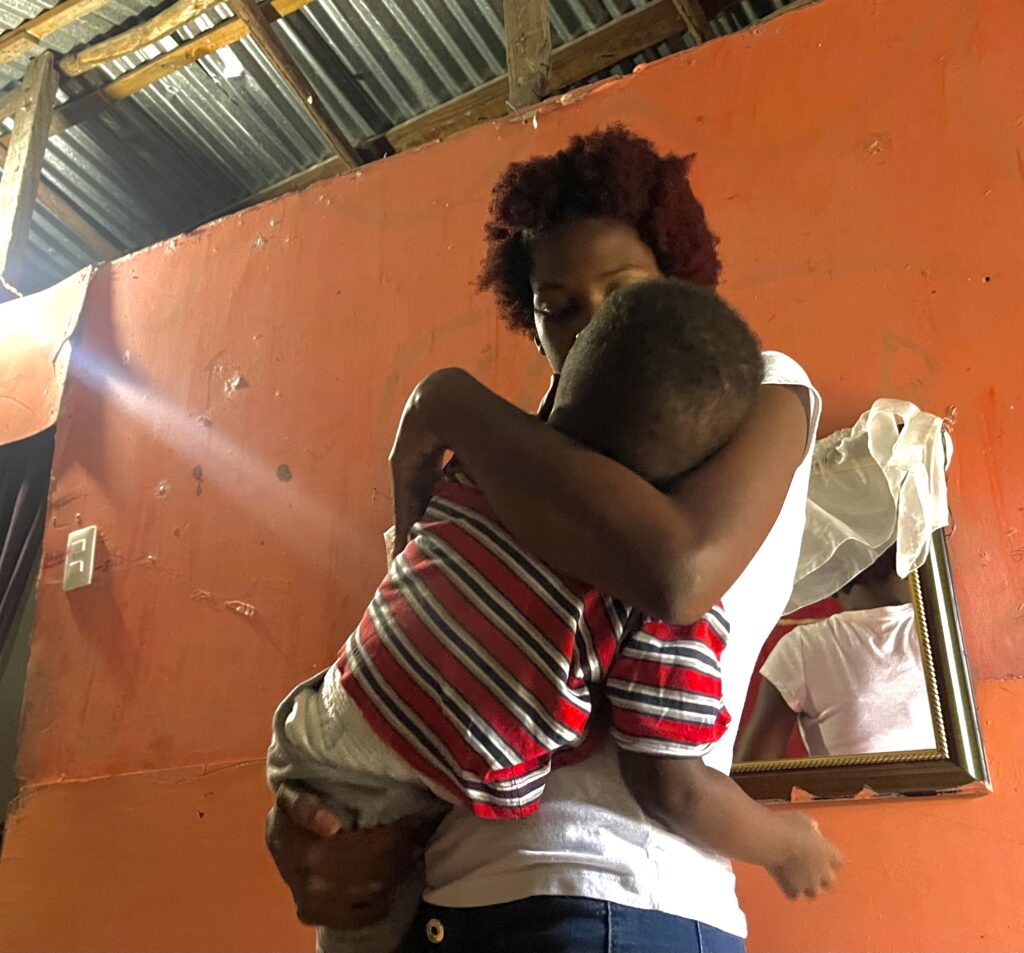
Niurki had never been taught about family planning, condoms, or birth control before she had her baby. Now a mother, she’s stuck at home, unable to make a living or pursue her studies. Today, Niurki supports activists who have been campaigning for decades for what they call “las tres causales,” or the three exceptions—measures that would lift the ban in cases of rape or incest, when the life of the mother is at risk, or when the fetus is not viable. President Luis Abinader had promised to support the three exceptions during his campaign, but he has failed to make good on those promises since he took office in August 2020. In July 2021, the Senate of the Dominican Republic voted 23-3 to support a criminal reform bill stripping out any language about the three exceptions.
The United States is months away from a 2024 election, in which the two leading Republican candidates for president and many of those running for Congress have vowed to pass a national abortion ban if they win. The dire situation for women in the Dominican Republic gives us a window into what that might mean for pregnant people here—including teenagers who are denied authority over their own bodies and their families.
No choices; devastating consequences
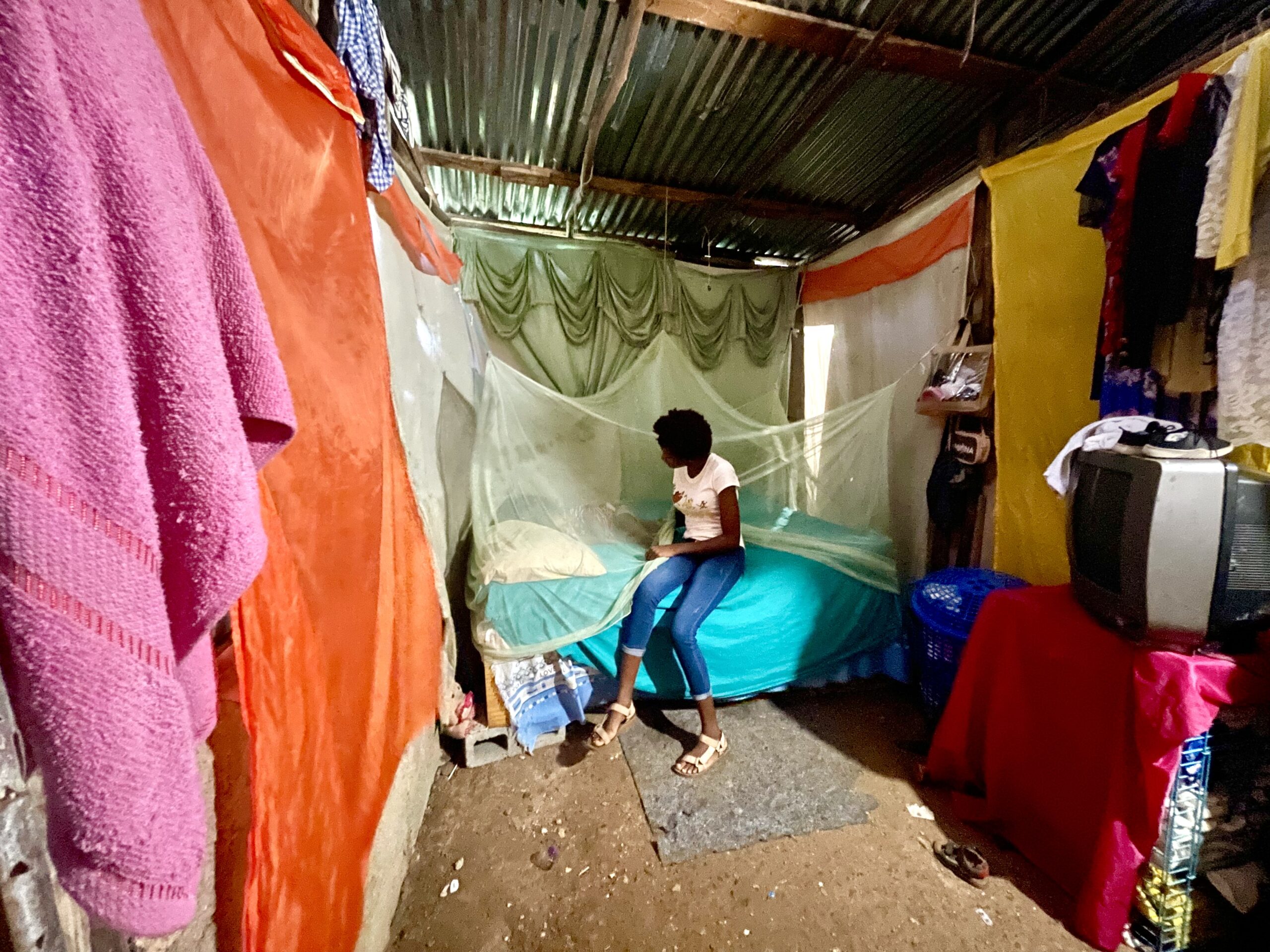
In the Dominican Republic, the responsibility for every aspect of reproduction—from preventing it to raising children—falls entirely on women. “Less than one percent of men use condoms,” Dr. Lilliam Fondeur, a gynecologist and activist, tells me during a conference on reproductive rights in Santo Domingo, the country’s capital. Sexual education in schools is practically nonexistent because, doctors say, even talking about sex is perceived as encouragement. And while contraceptives are theoretically available, 46 percent of women either don’t know about them, can’t afford them, or are reluctant to ask because they fear people in their communities will find out. However, sterilization is a common method of contraception in the Dominican Republic, particularly among women who are married or in domestic partnerships (30.5 percent), but 25 percent of women who opt for sterilization don’t understand the procedure is irreversible. “On the one hand, the government tells you not to abort,” Dr. Fondeur says. “On the other, it doesn’t provide the means to avoid pregnancies.”
And the punishment for trying to end an unwanted pregnancy is severe: In this fervently Catholic and conservative country, which bears a Bible on its flag, women risk six months to two years of jail time. Meanwhile, for health professionals like Dr. Fondeur, the punishment for helping someone terminate a pregnancy is between five and 20 years of imprisonment. “Professional secrecy isn’t worth a damn,” Dr. Fondeur says. “You can go to jail even for only providing information. You don’t want the woman to die, but you have no alternatives.” As a result, she says, “twenty percent of teenage girls, mostly from rural and lower-income populations, are mothers. [In too many cases], they have babies with men up to 50 years older who tend to abandon them by the time they’re 18.”
But bans on abortion do not reduce the need for them. The Dominican National Health Institute estimates at least 100,000 illegal procedures occur per year. At least eight percent of all maternal deaths are estimated to be the result of those who tried to terminate their pregnancies but died from infections and bleeding, and around 25,000 more women are hospitalized every year as a likely result of unsafe abortion.
“Professional secrecy isn’t worth a damn. You can go to jail even for only providing information. You don’t want the woman to die, but you have no alternatives.”
And as in the U.S., the consequences of criminalization are also dire for those with wanted pregnancies. Damaris, a 31-year-old Dominican woman of Haitian descent, experienced terrible pain in her abdomen 16 weeks into her third pregnancy. Her sister Juliana told me she took Damaris to more than five different hospitals and clinics—all of which claimed they didn’t have the means to perform a sonogram, something Juliana later learned was not true. In an apparent effort to avoid abortion, “they went as far as to pretend the baby was still alive when she was, in fact, dead,” she says. With the dead fetus inside her for several days, Damaris went septic and ultimately died in great pain. “She left a son who, because of her death, has refused to go to school ever since, a daughter who tried to cut her veins and survived but still has no friends,” Juliana says, “and a father who succeeded in committing suicide after various attempts.”
Those stories are everywhere in the Dominican Republic. When Rosa Hernandez’s daughter, Rosaura, began suffering from high fevers and getting bruises all over her body at 16, Rosa brought her to Santo Domingo hospital. There, on July 2, 2012, she was told that her daughter was four weeks pregnant. What she wasn’t told was that Rosaura had a deadly and fast-moving form of leukemia and needed urgent chemotherapy that was denied to her because of her pregnancy. She was suffering but wasn’t prescribed painkillers—also allegedly to protect the fetus. “Get me out of here! They’re going to kill me!” Rosaura told her mother. Rosa begged the doctors. “I humiliated myself. I went on my knees,” she remembers. Rosaura was only given chemotherapy on July 26—three weeks after her diagnosis—and died less than a month later on Aug. 17.
There is only one organization in the country—the Colegio Médico Dominicano—that, alongside other mandates, protects women inside hospitals where this kind of obstetric violence is rampant. Francisca Peguero, an advocate for the Colegio Médico Dominicano, told The Meteor that if women arrive bleeding because they tried to provoke an abortion or have an infection, hospitals treat them without painkillers. “They are guilted and singled out in the eyes of the community,” Peguero says. “When a woman dies giving birth, there are no investigations; it’s simply filed as internal bleeding.” She tells me about one of the most painful cases she’s seen in her 30-year career: a 14-year-old girl with a banana stuck in her uterus, the only method she had thought of to abort. The girl had been reported to the authorities by her own mother, and when she was taken to the hospital bleeding, policemen were waiting for her in the next room. Later, Peguero found out the girl had died from her injuries and that her pregnancy was the result of incest.
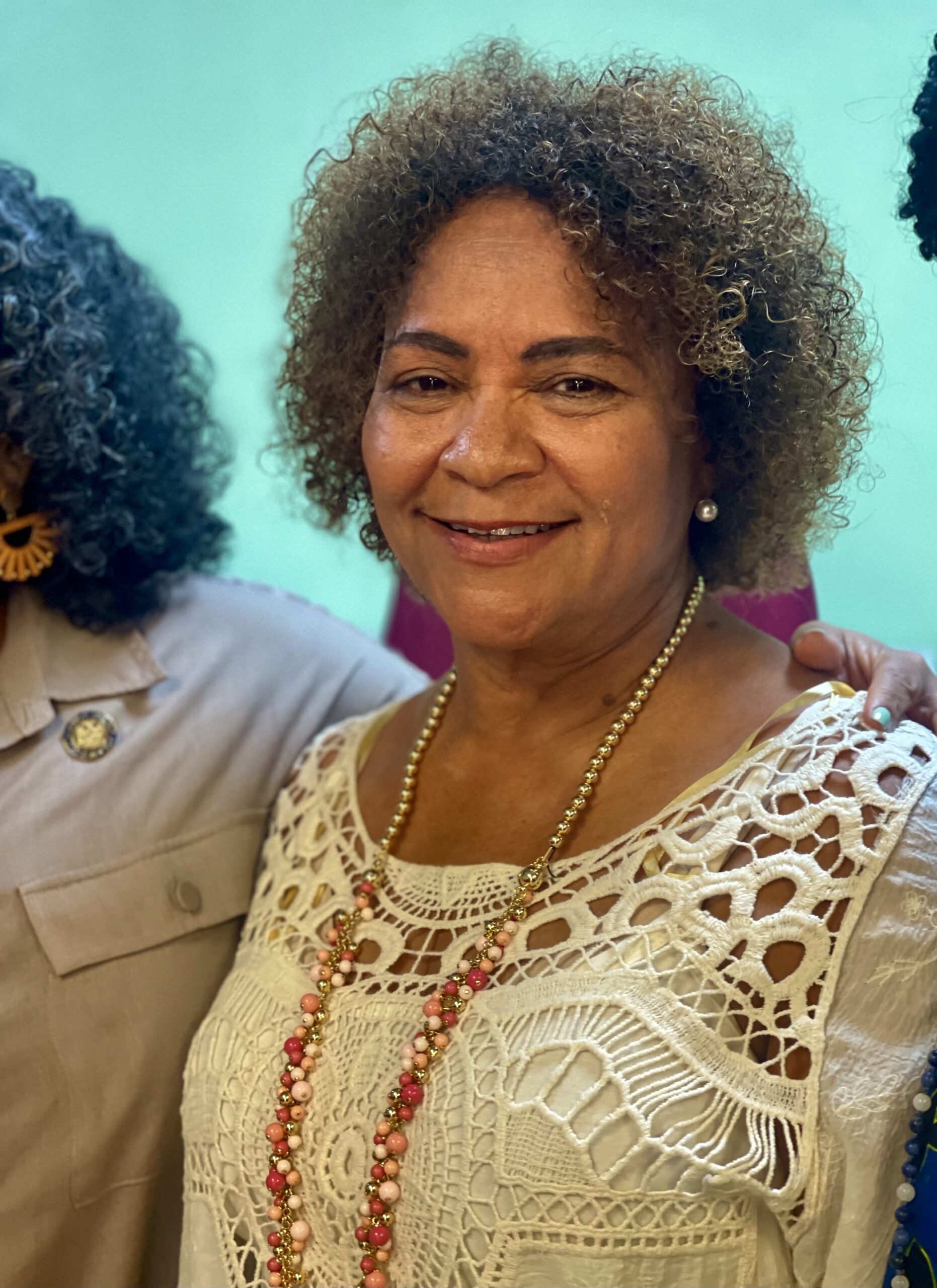
In Estebenía, a couple of hours west of the capital, Dr. Jaime Calderon runs a modest, rural health clinic. Dr. Calderon, a bold, bespectacled man in his 40s, doesn’t like to discuss abortion, but he admits to treating girls who have tried to end their pregnancies. “They use ancestral herb beverages to induce abortion, or they introduce objects in their uterus, give blows to their abdomen, or take harmful medications,” he says.
Clandestine clinics practicing safer abortions charge 500 US dollars—an exorbitant fee when the monthly minimum wage here is 250 US dollars. The safe abortion drug misoprostol is available on the black market (and, because it’s prescribed to fight ulcers, in select pharmacies), but it is also cost-prohibitive. “Meanwhile, the church keeps preaching abstinence,” Dr. Calderon says. “Imagine that! Abstinence in the DR!”
Performing a miracle
Nonetheless, advocates continue to push for change. And, as a young mom, Niurki joined Conamuca, The National Confederation of Country Women, in San Cristobal, the region with the highest rate of teen pregnancies and child marriage. The feminist NGO strives to teach and give a voice to girls 13 to 17. “On average, they start their sexual lives at age 12 without information about planning or sexually transmitted diseases,” says Lydia Ferrer, one of the program leaders.
At the Conamuca Center, a large group of Black teenage girls sit in a circle under a thatched roof and a single fan hanging from the ceiling. A green banner in support of women’s health has been set on the floor, surrounded by offerings of bananas, beans, tomatoes, onions, squash, and carnations. Ferrer nods proudly as she listens to “her” girls presenting their research on the prevention of domestic violence. Indeed, everyone here sounds assertive—joyful, even. “Teaching feminism is like performing a miracle,” Ferrer says. “Educating these girls about reproductive rights and their integrity in general is saving their futures.”
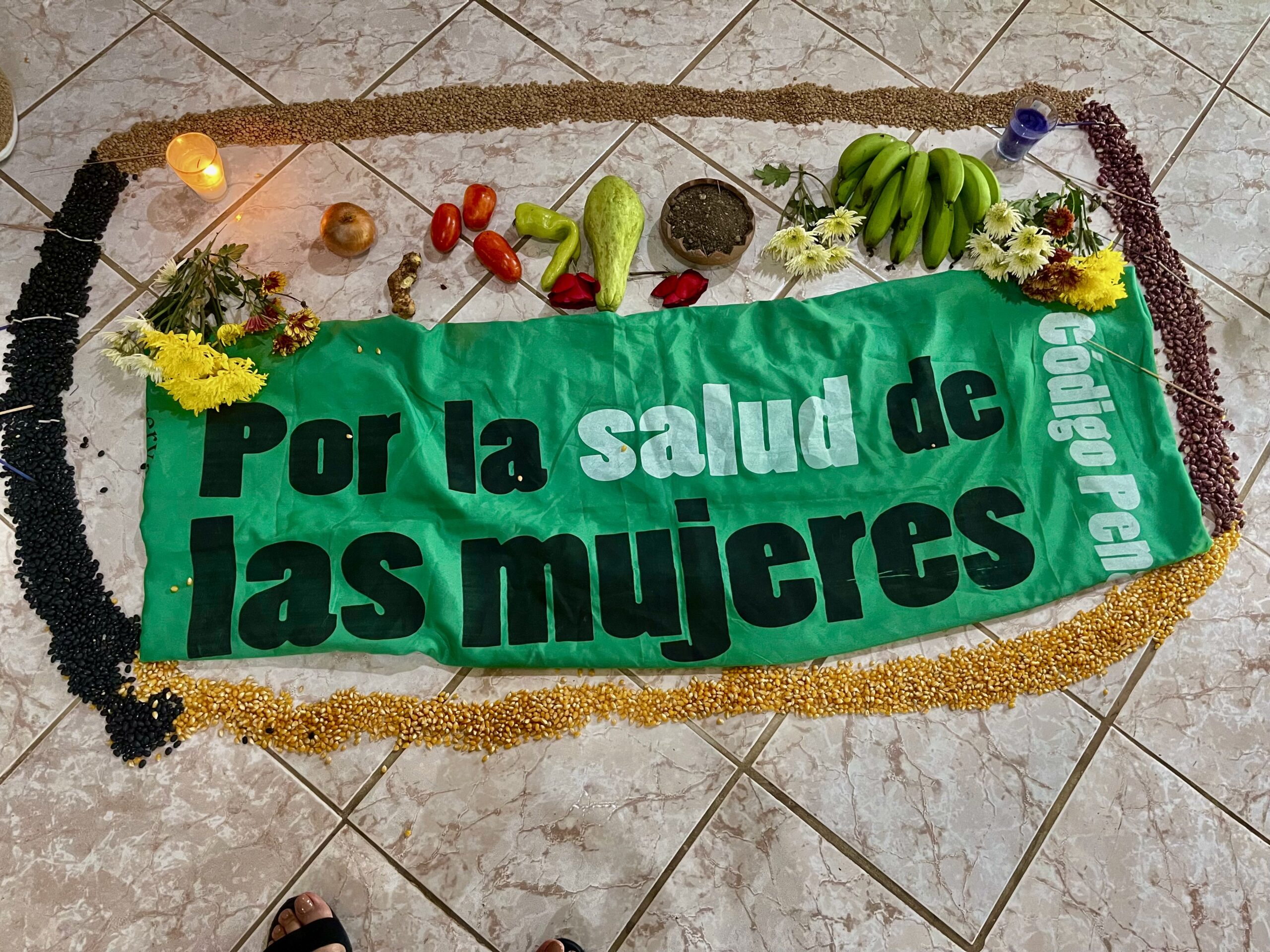
Ariana, 18, considers herself lucky: Ferrer is her mother. As a young girl, she went with her to visit vulnerable communities. She heard stories of incest pregnancies in which the girls didn’t even know that what was done to them was wrong. Most households were managed by single women, and it was often mothers who sold their daughters into forced marriages or unions out of poverty. It still is. “The man goes and promises a cow, a truck, or money, rarely more than 500 USD. But they never deliver; they say she’s not a virgin anymore. What is the community going to say?” Ferrer says. “The new family turns them into maids. When they get pregnant, they can’t have an abortion, so they are sent back to the parents who sold them in the first place—without an education, with one or two babies, and without a penny to their names.” Ariana witnessed how difficult it is to convince grown-up women that educating their daughters is a better investment than selling them off. “But to induce change,” she points out, “it’s easier to educate ten-year-old boys than to change the mind of fifty-year-old women. ”
It’s 4 p.m., and the baby finally falls fast asleep in Niurki’s arms, despite music blasting from a neighbor’s stereo. A drunken pair in their 40s is dancing Bachata at a makeshift bar next door. Niurki puts the baby down, and her mother, Yeimi, tells me that she, too, had her first baby at age fifteen. “What Carlos, Niurki’s ex-boyfriend, did was pure evil,” she says, barely containing her indignation. “In our patriarchal society, it’s a brag to get a teenage girl. He had no intention to stay with her or the baby. He defiled her. Like we say here, a fly doesn’t eat the meat, but it wastes it. The idea is that no one else will be her first.” Outside Niurki’s house, a truck swivels its way around the giant potholes on the unpaved road with two large stickers that say God loves you and Jesus is coming. Niurki waves to a girl who lives across the path from her. “She’s sixteen,” Niurki says. Sitting on a red plastic chair, the girl is holding her own baby. She wears a fitted bright pink dress. She looks bored and annoyed, as if she was meant to go to a dazzling prom and was left to nurse a baby instead.
But Yeimi smiles, displaying a gap between her two front teeth; she is hopeful. Thanks to Conamuca and the education Niurki receives there, Yeimi is now confident her daughter will make it. Niurki currently attends school on Saturdays and vows to become a psychologist. Yeimi, too, is in school, training to graduate as a nurse; she wants to inspire her daughter. Right now, she works as a health promoter, climbing mountains and crossing rivers to spot potential teen pregnancies in remote communities. “I tell girls we have immense weaknesses, but we also have immense strength because we have suffered…we have weathered so much injustice, now we can stand strong. We’re studying, we’re rallying, demanding information, and getting economically independent. We are a new generation of feminists for the Dominican Republic.”
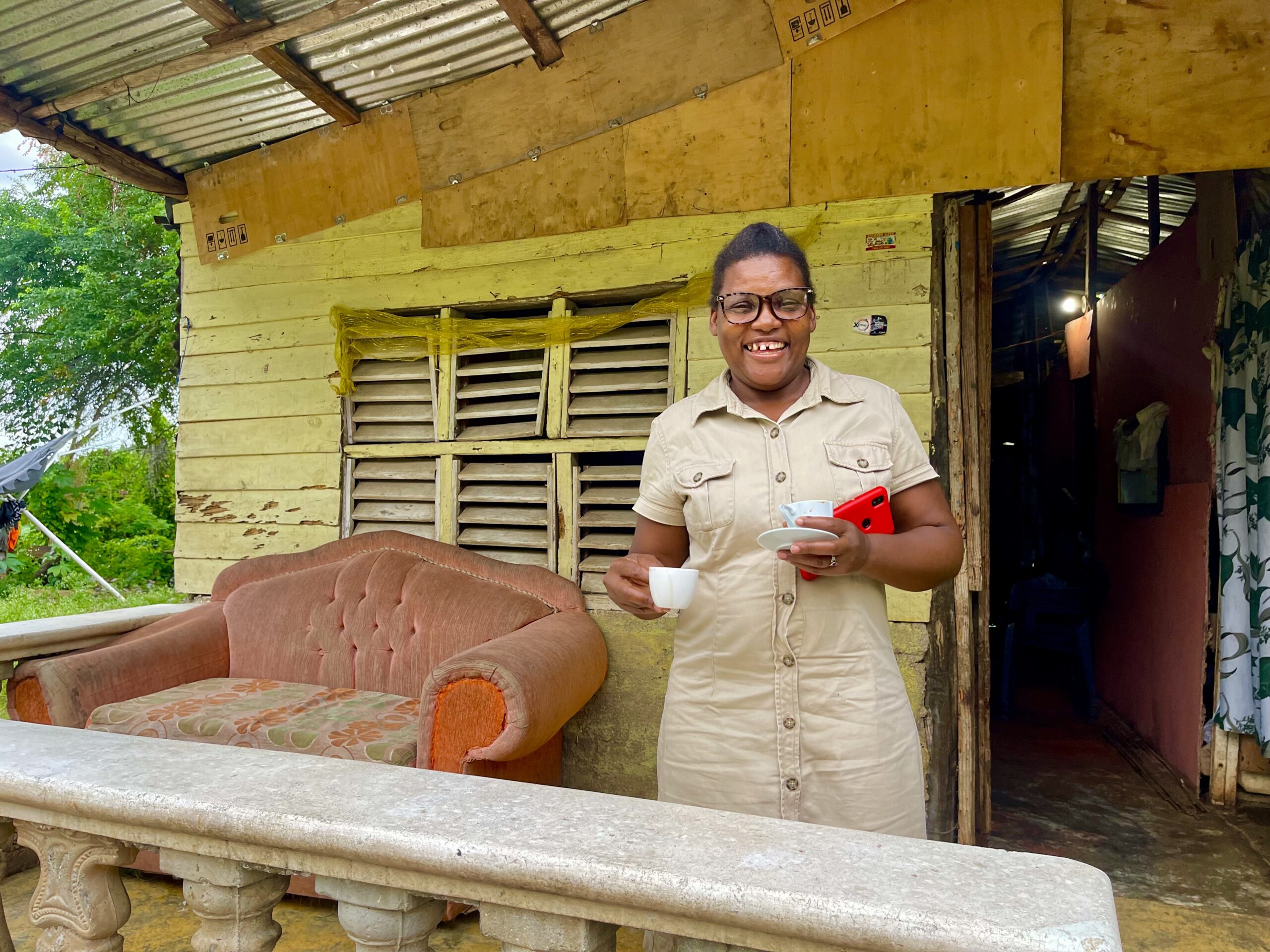
With municipal elections scheduled for February 18th and Congressional elections in May, Dr Fondeur stresses that in the Dominican Republic, violence doesn’t only come from patriarchy and machismo. “The worst and deepest violence is structural, it comes from the government politicizing abortion without consideration for women’s rights or for our health.” In watching the recent turn of events regarding abortion in the United States, Dr. Fondeur says, “ If the U.S. votes for a total abortion ban, we stand no chance of changing the law here,” she says. “We’ve always looked up to our neighbor, and now we’re scared.”
Mariane Pearl
Mariane Pearl is an award-winning journalist and writer who works in English, French and Spanish. She was most recently the managing editor of CHIME FOR CHANGE, and is the author of the books A Mighty Heart and In Search of Hope.
The AI Threat (Taylor's Version)
 January 30, 2024 Howdy, Meteor readers, This email almost didn’t make it to you today. This morning, I woke up and saw that Calvin Klein launched a new campaign featuring Idris Elba, and knowing that my day could not get any better, I went back to bed. But it did, in fact, get better. I went down an Idris Elba rabbit hole (recommend), and found that the actor/model/DJ/rapper is also the face of a campaign aimed at pushing the British government to ban the sale of “zombie-style” knives, the weapon of choice for young people committing knife crimes (which are currently on the rise there). In today’s newsletter, we take a look into non-consensual, AI-generated pornography. Plus Florida’s latest attack on trans residents, dueling rappers, and the death of an icon. Buying a CK coat, Shannon Melero  WHAT'S GOING ONKarma is the girls in the seats: Last week, Xwitter was flooded with pornographic images of Taylor Swift, all of which were AI-generated deepfakes. The response from her fanbase was immediate, with thousands of Swifties reporting and burying the images online with a level of coordination that military tactical units will someday study. And while I’ll take every opportunity to write about Swifties saving the day, this incident has also brought to the forefront the pervasiveness and dangers of AI porn. Swift certainly isn’t the first person to be targeted by the dark forces that produce AI porn. Just a few days before false images of Swift spread online, actress Xochitl Gomez, who’s still a minor, discovered that her face had been edited into sexually explicit images and circulated on Xwitter. Gomez has been trying to get the images removed without success. (Swifties, activate!) Meanwhile, Xwitter put a temporary block on using the search words “Taylor” and “Swift” less than a day after those images went viral.  TAYLOR SWIFT IN NEW YORK EARLIER THIS MONTH. (PHOTO BY GOTHAM VIA GETTY IMAGES) Swift herself is considering legal action (and Missouri recently introduced the Taylor Swift Act), potentially bringing the kind of high-profile attention that could be a major tool in the fight against AI-generated porn. But court cases take time, and this crime is proliferating fast. AP reported in December that 143,000 new deepfake videos—many featuring underaged girls—were posted online in 2023 alone, more than in all previous years combined. (The tech to make these kinds of videos has been available to general users since 2017; there was even a now-defunct app called DeepNude that made it as easy as pushing a button.) In an interview with Slate, Sophie Maddocks, a cyber sexual violence researcher, explained that in a seven-month span in 2023, “there was a ten-fold increase of AI-generated nude images online,” which victimized preteen boys as well as young girls. While there is a federal bill on the table that would criminalize the production of deepfakes, Maddox calls the current legal protections in place—including a handful of state bills—a “patchwork in terms of civil and criminal recourse.” Victims have little to no options unless they can rpay the exorbitant lawyer fees and spend the time it takes to scrub these images from the internet—which platforms like Facebook and Xwitter aren’t in a rush to do. Maddox also points to an issue that feminist technologists have long called out: What would it look like “if we had created these AI tools in a social environment that did center consent and that did prioritize consent”? Technological developments that consider the implications for those most likely to be harmed? Imagine that! AND:
 PROTESTORS IN KISUMU, KENYA. (PHOTO BY BRIAN ONGORO VIA GETTY IMAGES)
 FOLLOW THE METEOR Thank you for reading The Meteor! Got this from a friend? Subscribe using their share code or sign up for your own copy, sent Tuesdays and Thursdays.
|
![]()
64,565 "Rape-Related Pregnancies"
 January 25, 2024 Hey Meteor readers, I am a big Jeopardy girlie, so you just KNOW that last night’s episode, in which the entire first round of categories were Taylor Swift song titles, had me screaming with glee. Those clue writers do not miss (and, for most of those categories, neither did I)!  SCREENSHOT VIA JEOPARDY In today’s newsletter, we dig into the new, horrifying research about rape survivors and abortion. Plus, Florida is doing weird stuff again, Ohio overrides a gubernatorial veto, and we offer you some weekend reading. Makin’ the whole place shimmer, Shannon Melero  WHAT'S GOING ONNo real exceptions: Yesterday, a new research paper published in JAMA Internal Medicine revealed some shocking findings: Since the Supreme Court overturned Roe v. Wade in 2022, there have been approximately 64,565 “rape-related pregnancies” in the 14 states with total abortion bans. (Ninety-one percent of those pregnancies took place in states with bans that provided no exceptions for rape.) Put more plainly: Almost 65,000 pregnant rape survivors were left without a legal option to terminate their pregnancies in their home states. That’s enough people to fill Madison Square Garden three times. These figures are estimates, but they’re based on data analysis of sexual violence and pregnancy statistics from the CDC and Bureau of Justice Statistics. They also reveal something vitally important: Rape exceptions are not doing what politicians tell us they’re meant to do. The researchers found that “10 or fewer legal abortions” per month total took place in states with bans (including those with so-called rape exceptions), proving that “rape exceptions fail to provide reasonable access to abortion for survivors.”  PHOTO BY MONIQUE MONROE VIA GETTY IMAGES Why aren’t those rape exceptions working? In practice, many come with strict requirements, most commonly that a survivor must be under a certain number of weeks pregnant and report their rape to the police. But in the U.S., rape and sexual assault are the most under-reported crimes in the country; in 2023, only an estimated 39% of total rapes were reported to the police. And that’s the problem with many abortion-ban exceptions. They’re not inherently designed to help victims; they’re compromises meant to lend better optics to politicians trying to mask their anti-abortion stances. Some legislators, of course, are perfectly comfortable coming out against rape victims (see: these monsters), but others use exceptions as a political tool, working to rebrand themselves as less extreme, almost reasonable, in a bid to win over moderates. But these numbers show that exceptions and half-measures are not in the best interest of sexual assault victims. Politicians should either vote in favor of abortion access, or be honest that they’re not bothered by people suffering AND:
 PLAYERS FROM BARCELONA AND THE U.S. COMING TOGETHER IN SUPPORT OF JENNI HERMOSO, 2023. (PHOTO BY MAURICIO SALAS VIA GETTY IMAGES)
 CLICK THE LINK ABOVE TO GET YOUR UNIQUE SHARE CODE TO SEND TO A FEW FRIENDS. IF FIVE OF THEM SIGN UP FOR THIS NEWSLETTER, YOU GET A METEOR TOTE! ALREADY HAVE A CODE BUT CAN'T FIND IT? NO WORRIES, IT'S WAITING FOR YOU DOWN BELOW ⬇️
 WEEKEND READING 📚Online: The influencer economy has changed everything about the way we buy. But what does that mean for eco-influencers whose platforms are against the idea of consumption? (Atmos) On and off the field: Ali Krieger had a jam-packed 2023: retirement, a championship, and an extremely public divorce from fellow soccer star and long-time partner Ashlyn Harris. She’s finally ready to talk about all of it. (Self) On a crumbling industry: Digital media is once again in freefall, and one of the latest victims of the ever-changing landscape is Pitchfork. (Vulture) On showing up: Rabbi Sharon Brous reflects on how an ancient religious pilgrimage still applies to how we move in the world today. (The New York Times)  FOLLOW THE METEOR Thank you for reading The Meteor! Got this from a friend? Subscribe using their share code or sign up for your own copy, sent Tuesdays and Thursdays.
|
![]()
C-Sections With No Anesthesia
 January 23, 2024 Greetings, Meteor readers, I don’t know about you all, but I’ve been in a reading funk. My usual stack of Plantagenet and Tudor historical tomes just hasn’t been doing it for me. So I ignored my incredibly robust TBR pile and bought a new book, Naomi Osaka: Her Journey to Finding Her Power and Her Voice. Anyone else reading it? Let’s be book buddies. In today’s newsletter: the horrifying and intimate ways women are suffering in Gaza, Nikki Haley’s race to the finish, and what you can do to support Trans Girl Scouts. Sitting on a book stack, Shannon Melero  WHAT'S GOING ON A YOUNG DISPLACED PALESTINIAN GIRL LIVING IN RAFAH, SOUTHERN GAZA. (PHOTO BY AHMAD HASBALLAH VIA GETTY IMAGES) New atrocities: As the bombardment of the Gaza Strip goes into its fourth month, new reporting and research has shed light on what that means for Gazan women. According to UN Women, an estimated one million women and girls are living in a makeshift tent city in Rafah, a city in southern Gaza, where they lack access to basic necessities like food, water, medical supplies, and…menstrual pads. For those menstruating, many have resorted to using scraps of their clothes and cutting up tents—in other words, trading their only shelter—to create makeshift pads. Without water or reliable sanitation, they’re at higher risk of dying from toxic shock syndrome or contracting life-threatening infections (which they do not have access to medicine to treat). Pregnant women also face insurmountable odds, with almost no functioning hospitals left in the region. Last week, Jezebel cited a reported 300% increase in miscarriages. Those who don’t miscarry must give birth in tents or undergo C-sections without anesthesia, where doctors aren’t even able to wash their hands to perform the procedure. The UN report found that at least two mothers are killed every hour in Gaza. So how can you help? The report lists three asks from women’s organizations: to support the “urgent need for an immediate ceasefire,” prioritize the funding of women’s organizations, and to ensure that those groups are instrumental in planning and implementing a humanitarian response. You can call your representative to urge a ceasefire and consider donating to ANERA, which is currently working on delivering hygiene and menstrual products to women in Gaza. Or you can donate to International Planned Parenthood Federation, which provides care in conflict zones worldwide.  CANDIDATE AND RACISM DENIER, NIKKI HALEY. (IMAGE BY JOE RAEDLE VIA GETTY IMAGES) The big race: With Ron DeSantis out of the running for the GOP nomination, only one person stands between Donald Trump and his potential return to the White House: Nikki Haley, who as we send this newsletter is in her last hours of her fight against Trump. Haley spent a lot of the last week defending her claim that “America isn’t a racist country”—although apparently, no one told Trump that, since he lobbed a few racist zingers at her on social media over the weekend. And if Haley did need further proof that racism exists, she might simply read her own memoir, in which she wrote that her Indian parents were barred from renting a home because her father “worked at the Black school,” and that when they did finally find a place to live, they were told “they couldn’t entertain Black people” in the house they owned. There’s a word for that kind of behavior, Nikki. It starts with an R and ends with a how can you really look America in her eyeballs and say racism doesn’t exist when you know it does??? AND:

 FOLLOW THE METEOR Thank you for reading The Meteor! Got this from a friend? Subscribe using their share code or sign up for your own copy, sent Tuesdays and Thursdays.
|
![]()
Another Year Without Roe
 January 22, 2024 Dear Meteor readers, Today is the 51st anniversary of Roe v. Wade—the Supreme Court decision that legalized abortion. As you know, Roe was the law of the land until 2022, when SCOTUS ruled in Dobbs v. Jackson Women's Health that abortion is not a right “deeply rooted in this Nation's history or tradition.” Since then, we’ve seen exactly what life without Roe looks like for the birthing population of the United States. We’ve met women forced to become walking coffins for their untenable pregnancies; seen the rise of fetal personhood laws, which restrict pregnant people’s rights; and listened to the stories of providers terrified to be prosecuted simply for wanting to give vital medical treatment. At The Meteor, we’ve been proud to tell those stories, and are committed to continuing to do so. Here are five from the last year—all of which paint a picture of what we’ve lost, and how patients and providers are fighting back. Sincerely, Samhita Mukhopadhyay  When Pregnancy is Criminalized by Neda Toloui-Semnani Lauren Smith thought she knew what to expect as she was rushed into the operating room. At 26, it was her third cesarean section. “I don’t remember much before or after because everything moved so fast,” she says. “I remember crying. I remember being cold and being wheeled in there, and then, laying back, and then, I remember looking at the clock. It was at an angle.” The surgeon cut her open and pulled out a squirming infant, a baby girl Smith would name Audrey. Delivered a month early, she was a strong, healthy, kicking-screaming, six-pound, five-ounce newborn. Smith thought she knew what would come next. But like a character in a Kafka tale, her world had shifted while she slept. Abortion Ban Survivors Run for Office by Nona Willis Aronowitz If you’d asked Allie Phillips last year whether she’d consider running for office, she would have given you a quick “no.” But that was before a series of events gave her a front-row seat to just how little Republican politicians understand about women’s lives. Back in March, the 28-year-old Tennessee mom and home daycare worker had gone viral on TikTok for sharing her gut-wrenching abortion experience: At her routine 19-week anatomy scan, she’d found out that her daughter, whom she’d already named Miley Rose, had severe fetal anomalies and would not survive outside the womb. Her doctors told Phillips that continuing the pregnancy would put her at risk, but because of Tennessee’s strict abortion ban, they couldn’t help her. She’d have to find another way. A “Tidal Wave” of Southern Abortion Seekers by Stassa Edwards When the Dobbs v. Jackson decision dropped, it had an immediate impact on the lives of millions of people—particularly those in the South, where trigger laws swiftly went into effect in Kentucky and Louisiana, then Texas, Alabama, and Mississippi; abortion is now banned with few exceptions. And with that, patients found themselves turning to an unlikely place: Florida. Harm and Hope in Post-Roe America by The MeteorWhen Nancy Davis, 36, found out she was pregnant last summer, she was so happy that she danced around her home with her fiancé and two children to celebrate. “It was like a party,” she told The Meteor’s Tara Abrahams. But at her 10-week checkup, an anatomy scan showed that the fetus Davis was carrying was developing without a skull. “The top of the head was completely gone,” she says. The prognosis was grim: If Davis tried to carry her pregnancy to term and deliver, doctors warned that the child would die within minutes. She needed an abortion. A Crucial Year Ahead for Abortion Access by Susan Rinkunas One after another, we’ve read awful stories of patients being rushed to the ICU with sepsis, nearly bleeding out in bathrooms, or having to go out of state for abortions when their fetuses don’t have skulls. Amid all this news, it can be hard to pinpoint a bright spot, but there is one: Support for abortion has repeatedly won elections. In what would have otherwise been a sleepy off-year of races, voters were so furious about their rights being taken away that they re-elected a Democrat as Governor in Kentucky, codified abortion in Ohio, and flipped a chamber in Virginia, blocking a ban there. What can we expect this election year as we officially enter our second year without Roe?  FOLLOW THE METEOR Thank you for reading The Meteor! Got this from a friend?
|
![]()
Saudi Arabia might host the Billie Jean King cup
 January 18, 2024 Greetings, Meteor readers, If you’ve been with us long enough, you likely know I—like almost half of Americans—have an unnatural obsession with reality television because I am, as a coworker put it, “a garbage person.” I see no lies. So it behooves me to share with my fellow garbage goblins that Love is Blind: Sweden is where it’s at right now. If you plan to be indoors this weekend hiding from the weather, please give it a watch and let me know exactly how much you hate Sergio. In today’s newsletter, we’re meeting up at the intersection of global politics and women’s sports—my favorite place to be. Plus a frightening bill looking to ban gender-affirming care, and a monumental lawsuit. Love is Swedish, Shannon Melero  WHAT'S GOING ONA Prince and the King: For years, the nation of Saudi Arabia has been using sports to improve its image on the global stage—or, as Human Rights Watch called it, “sportswashing.” In lieu of addressing the limited freedoms women have in the country, Prince Mohammed bin Salman al Saud (or MBS as he’s referred to) has been focusing his attention on acquiring licenses to bring (mostly) American sporting leagues and top-name athletes to Saudi. (His most notable contracts are a 10-year multi-billion-dollar agreement with the WWE, the LIV golf merger, and an ambassador deal with Rafael Nadal.) Now, the Kingdom is in talks to host the 2025 Billie Jean King Cup (BJK), aka the most prestigious tournament in women’s tennis. Why should this matter to anyone but diehard tennis fans who may have to figure out how to get to Saudi Arabia come Cup season?  THE CHAMPIONSHIP TEAM FROM THE 2023 BILLIE JEAN KING CUP. (IMAGE BY MATT MCNULTY VIA GETTY IMAGES) Two key reasons: The first is, of course, money. Like most sports, there’s still an alarming gender pay gap in tennis. According to Sportico, “Across 2020, 2021, and 2022, the top 10 male players earned 53% more than their female counterparts.” And despite women’s earnings increasing (Iga Swiatek was the third highest-paid tennis player in the world in 2023), the Women’s Tennis Association Tour won’t reach pay equity with its male counterpart, the ATP, until 2033. That’s a long time to wait. While a new host country won’t close that gap overnight, the Saudis have made it abundantly clear that they’re willing to put their money where their mouth is, which could easily translate into a larger prize pot for players. It also creates an opening for players—particularly African and Middle Eastern ones—to reach a wider audience and, therefore, more earning opportunities. The second reason is human rights. It’s impossible to ignore the country’s litany of violations—gender discrimination, the use of torture, and the brutal, state-sanctioned murder of journalists. When the WTA announced it was considering Riyadh as a location for its finals, tennis immortals Martina Navratilova and Chris Evert penned a letter against the move citing the Kingdom’s anti-LGBTQ stance. World number-six-ranked player Ons Jabeur has expressed support in bringing women’s tennis to Saudi Arabia, but her colleagues have yet to share what they think. And we cannot forget the Billie Jean King of it all. Last year when asked about whether or not the Cup could end up in Saudi, King told Reuters, “The thing I’m concerned about is the women, I want change if we go. But I’m big on engagement and inclusion so it’s a tough one.” AND:
 WEEKEND READSOn conflict: The seemingly disjointed battles taking place across the Middle East may be sending global superpowers into one big war. (The New Yorker) On money: What is unpaid caregiving really costing women? Their retirement. (The Washington Post) On polyamory: Monogamists are bored. (The Cut) On growth: Hala Alyan on the power of changing your mind. (Time)  FOLLOW THE METEOR Thank you for reading The Meteor! Got this from a friend? Subscribe using their share code or sign up for your own copy, sent Tuesdays and Thursdays.
|
![]()
Donald Trump's Defamation Trial (Part 2)
 January 16, 2024 Happy Monduesday™, Meteor readers, Big week ahead! I am, of course, talking about the opening rounds of the Australian Open, which has already seen the exit of Naomi Osaka, returning to the sport after giving birth to her first child. It’s also a huge week for us here at The Meteor, as tomorrow we’ll be premiering the first two episodes of our brand new podcast, The A Files: A Secret History of Abortion. More on that tomorrow! In today’s newsletter, we run through the madness in Iowa, catch up on what’s happening in Iran, and learn about a groundbreaking food program in Colorado. Shoveling snow, Shannon Melero  WHAT'S GOING ONAll about Don: In a landslide victory, Donald Trump—a man currently facing 91 criminal charges and a candidate who has refused to participate in a single debate—took first place in the Iowa caucus. Ron DeSantis came in second, Nikki Haley in third, and Vivek Ramaswamy dropped out entirely and gave his (meaningless) endorsement to Trump. Speaking of Trump, instead of celebrating his win in Iowa, he’s back in New York standing trial in a second defamation case to decide a suit brought by E. Jean Carroll. He lost the first one. This time around, he will reportedly be taking the stand in his own defense against Carroll, who says he defamed her by denying having attacked her in a dressing room in the 90s. Like the previous case, this is a civil matter—Carroll is suing for $10 million in damages. Maybe I’m the only person left in the country who feels this way, but it’s genuinely shocking that the lead GOP presidential candidate is spending so much time defending himself in court. AND:


 FOLLOW THE METEOR Thank you for reading The Meteor! Got this from a friend? Subscribe using their share code or sign up for your own copy, sent Tuesdays and Thursdays.
|
![]()
Coretta Scott King's Misrepresented Legacy
 January 11, 2024 Hey, Meteor readers, Y’all, I encourage you to check in on your football friends. We’ve had a tough week. And by we, I mean me, since the hottest old man I’ve ever seen chew gum, Pete Carroll, is no longer the head coach of the Seattle Seahawks.  In today’s newsletter, we remind everyone who Coretta Scott King really was. Plus, banning sexy books in Florida, abnormal weather, and weekend reading. Pete, my DMs are open, Shannon Melero  WHAT'S GOING ONMore than someone’s wife: If you’re not caught up on why everyone’s discussing Coretta Scott King, here’s the TL;DR: In December, actor Jonathan Majors was found guilty of assault and harassment. During his trial, a recording was played for the jury in which Majors berated his then-girlfriend Grace Jabbari, telling her that she needed to comport herself like Mrs. King. (His implication was he wanted someone who would stand beside—and in a sense behind—a powerful man.) Then this week, in an interview with Good Morning America, Majors doubled down on the sentiment, saying that his new girlfriend, Meagan Good, “held [him] down like a Coretta.” Ignoring for a moment that Majors is trying to compare himself to Dr. Martin Luther King Jr., the assertion he’s making here is that Coretta Scott King was a woman of value because of her willingness to stand by her man no matter what. As Brittany Packnett Cunningham explained on Instagram, Coretta Scott King has been made out to be “the patron saint of cleanup women.” This is far from the first time Mrs. King’s life has been reduced to her marriage. I still remember Fabolous’ 2007 hit “You Make Me Better,” where he delivers the line, “Imma need Coretta Scott if I’m gonna be King.” But as Dr. Bernice King—her daughter—wrote in 2017, “Before she was a King, my mother was a civil rights activist, a member of the NAACP and the Race Relations and Civil Liberties Committees at Antioch College. Coretta Scott was determined that her life would serve to lift others. She was already a woman of great character.” Let’s also remember that without the work and persistence of Mrs. King, we probably wouldn’t have a Martin Luther King Day at all. So this year, rather than continue to misquote and decontextualize her husband, we give Coretta Scott King the recognition she deserves as an individual, a legend in her own right, and not just a supporting player. AND:

 WEEKEND READING 📚On “bouncing” back: The incomparable Naomi Osaka is making her return to tennis after becoming a mom, and she’s got a lot to say about it. (The Athletic) On sequels: The Ku Klux Klan had a significant revival in the early 1900s. With the extremist right gaining more power in the U.S., it’s worth revisiting how hate groups have managed to rebrand themselves successfully in the past. (Teen Vogue) On the podium: Did you watch the Republican primary debate between the remaining sad bunch last night? If so, you probably have the same question we have: “What is Nikki Haley even talking about?” (The Atlantic) 
 FOLLOW THE METEOR Thank you for reading The Meteor! Got this from a friend? Subscribe using their share code or sign up for your own copy, sent Tuesdays and Thursdays.
|
![]()
Why South Africa Is Bringing a Case Against Israel
 January 9, 2024 Hey there, Meteor readers, My new Panda Planner arrived in the mail over the weekend, and I can truly begin 2024 in earnest now that I have this oversized book to store my five different kinds of to-do lists.  In the words of Issa Rae, “I am about to be so much better. That text? Responded to. That email? Answered. That project? Finished. That other project? Started.” In today’s newsletter, we look at the charges being levied against the Israeli government, the Golden Globes, and a little bit of good news. This opener? Signed off, Shannon Melero  WHAT'S GOING ONDetermining genocide: On Thursday, the International Court of Justice in the Hague will begin hearings on the question of whether the Israeli government is guilty of carrying out genocide against Palestinians since the Hamas attack on October 7. The case, brought to the ICJ by South Africa, could be the first step in establishing a long-lasting ceasefire since a portion of the suit requests that certain immediate provisions—including a suspension of Israel’s campaign in Gaza—be made by the court. (Both Israel and the United States have called the suit “meritless.”) While it may seem odd that South Africa, a country with no obvious skin in the game between Hamas and Israel, would bring such a suit, the African National Congress has been a supporter of Palestine for decades (due to its own well-known history of enduring and eventually ending apartheid, the same policy that the United Nations has said Israel is carrying out in the Palestinian territories). Any territory that is a member of the United Nations and agrees to its treatises and jurisdiction can bring forth a suit against another member nation. And both South Africa and Israel are signatories of the 1948 Genocide Convention, which prohibits any signing nation from committing genocide. (The U.S. is also a signatory.) But while this case could prompt a ruling on whether or not Israel broke the treaty and committed genocide, it is not a criminal case and thus cannot dole out punishment for war crimes, something that would have to be decided by the International Criminal Court. Also worth knowing: South Africa’s suit focuses on military actions carried out against non-combatant groups—chief among them children—over the course of years. The lawsuit cites findings from the UNHRC’s 2019 Independent Commission of Inquiry, which found “reasonable ground to believe” that Israeli snipers “‘intentionally shot’ children knowing them to be children” as well as health workers and journalists. It also cites the disproportionately high deaths of journalists over the last two months illustrating that, “Palestinian journalists are being killed at a rate significantly higher than has occurred in any conflict in the past 100 years.” Looking for a quick decision on all this? Don’t. Hearings begin this Thursday and will continue into Friday, but those “prima facie” proceedings will only decide whether the case goes forward at all, and whether provisional measures can be implemented. That’s important—those measures could lessen the severity of the situation within a matter of weeks while the ICJ continues to deliberate—but an ultimate determination about the genocide classification will take years. ALSO IN THE NEWS AND:

 TELL ME SOMETHIN' GOOD 🎶
 FOLLOW THE METEOR Thank you for reading The Meteor! Got this from a friend? Subscribe using their share code or sign up for your own copy, sent Tuesdays and Thursdays.
|
![]()
"I've never seen anything like this"
 January 4, 2024 Hey there, Meteor readers, My Christmas tree is still up and I feel no shame about that. So if you, too, are a delayed tree remover, I see you and I love you. In today’s newsletter, we look at the devastating food crisis in Gaza. Plus, Claudine Gay speaks for herself, a big week for lawsuits, and your weekend reads. Lazily yours, Shannon Melero  WHAT'S GOING ONStarving to death: In late December, the United Nations released a report detailing “acute food insecurity” throughout Gaza. At the time, reporters found that more than 90 percent of the over 600,000 people living in the Gaza Strip were starving. At least 335,000 children were at risk of “severe malnutrition and preventable death,” according to the report. As we enter the fourth month of Israel’s bombardment of Gaza, the “entirely manmade…preventable catastrophic” food conditions are worsening. In an interview with The New Yorker’s Isaac Chotiner, Arif Husain, the chief economist at the United Nations World Food Program, described the situation as unprecedented. “I’ve never seen anything like this in terms of severity, in terms of scale, and then in terms of speed,” he says. Husain notes that the main contributing factor to the food crisis is inadequate and inaccessible aid. “On a good day, aid groups are bringing in maybe twenty-five to thirty percent of what [Gazans] need,” he told Chotiner. And the constant bombings and ground invasions by the Israeli military mean that even that small percentage doesn’t get properly distributed. All in all, Husain says 577,000 people in Gaza are classified as “I.P.C. Phase 5, meaning a catastrophic type of hunger.” That number accounts for 80 percent of the total global I.P.C. population. This degree of intentional starvation is also considered a war crime. The Rome Statute of the International Criminal Court classifies “the deprivation of access to food and medicine, calculated to bring about the destruction of part of a population” as a “crime against humanity.” As Husain makes clear, “[Aid] needs to go to where the people are. And I don’t know how you can do that without a humanitarian ceasefire.” ALSO IN THE NEWS
  WEEKEND READING 📚On ice: The Professional Women’s Hockey League is in its inaugural season and is already breaking attendance records. Could this be the league that lasts? (The Athletic) On the frontier: Pregnancy care in rural areas across the U.S. is dwindling, and those most at risk are Indigenous infants up against a congenital syphilis crisis. (Vox) On screen: Yet another lawsuit has come out against the production companies behind Love is Blind. What the hell’s going on over there? (The Cut) FOLLOW THE METEOR Thank you for reading The Meteor! Got this from a friend? Subscribe using their share code or sign up for your own copy, sent Tuesdays and Thursdays.
|
![]()
